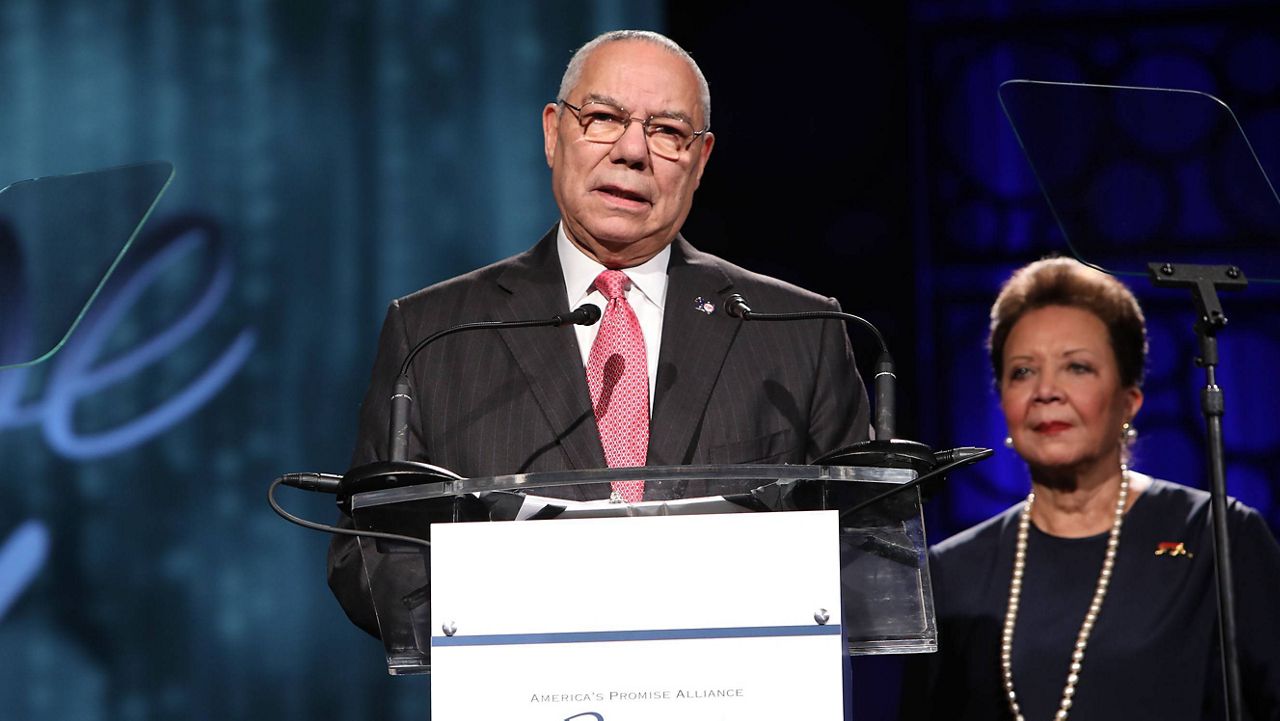Colin Powell discussed his declining health in a July phone interview with journalist Bob Woodward in what might have been the final interview the former secretary of state gave.
What You Need To Know
- Colin Powell discussed his declining health in a July phone interview with journalist Bob Woodward in what might have been the final interview the former secretary of state gave
- Powell, 84, died Monday of complications from COVID-19; he also had been treated for multiple myeloma, a blood cancer that impairs the body’s ability to fight infections, as well as Parkinson’s disease
- “Don’t feel sorry for me, for God’s sakes! I’m [84] years old,” Powell said. “I haven’t lost a day of life fighting these two diseases. I’m in good shape"
- Woodward asked Powell a number of foreign policy questions, as well as about the Jan. 6 Capitol riot
Powell, 84, died Monday of complications from COVID-19, his family said. He also had been treated for multiple myeloma, a blood cancer that impairs the body’s ability to fight infections, as well as Parkinson’s disease. Despite that Powell had been fully vaccinated, his advanced age and cancer history made him more vulnerable to severe COVID-19, medical experts say.
“I’ve got multiple myeloma cancer, and I’ve got Parkinson’s disease. But otherwise I’m fine,” Powell told Woodward by phone July 12, one of about 50 interviews between the former secretary of state and the renowned reporter dating back to 1989.
“Don’t feel sorry for me, for God’s sakes! I’m [84] years old,” Powell continued. “I haven’t lost a day of life fighting these two diseases. I’m in good shape.”
Woodward wrote about the interview in a Washington Post column published Monday night.
Powell said he made frequent visits to Walter Reed National Military Medical Center, where he died, for exams and blood tests.
“I’m a former chairman (of the Joint Chiefs of Staff), so they don’t want to lose me, so they make me come there all the time,” he said.
Woodward asked Powell a number of foreign policy questions, as well as about the Jan. 6 Capitol riot.
Powell, who had previously declared that he no longer considered himself a Republican after the insurrection, said former President Donald Trump “refuses to acknowledge that he wasn’t reelected. He has people who go along with him on that.”
Powell called the assault on the Capitol “awful.”
“He was going in there to overturn the government,” he said.
Powell also said he supported the decision to withdraw U.S. troops from Afghanistan.
“I thought we had to get out of there eventually. (We) can’t beat these guys. Well, let’s get it over with. Afghanistan, you’re never going to win. Afghans are going to win,” said Powell, who was both the first Black Joints Chiefs chairman and first Black secretary of state.
“They have hundreds willing to fight and die for this country of theirs. That’s why I don’t have any problem with us getting out of there. We can’t go from 100,000 (U.S. troops) down to a few hundred and think that’ll prevail.”
The interview was conducted before the Afghan government fell to the Taliban in August and before 13 U.S. service members were killed by a suicide bomber while trying to evacuate Afghans at the Kabul airport.
Powell said he wasn’t overly concerned about North Korea and Iran because those countries’ leaders should know there would be severe retaliation to any attack against the U.S.
“How does anybody think that North Korea would find a way to attack us without us destroying them the next morning?” he said. “How can anyone think equally of Iran? Iran and North Korea cannot be our enemies because they cannot stand the results of such a conflict. We’re going to be terrified of these people? No. Would they dare?
“Let the little jerk [North Korean leader Kim Jong Un] have his parades and what not,” Powell added. “He’ll never try to attack us because he knows it would be assisted suicide.”
Woodward asked Powell: “Who was the greatest man, woman or person you have ever known? Not ... a leader, not necessarily, but the inner person. You know, the moral compass, the sense of propriety, the sense of the truth matters.”
Powell quickly answered that it was his wife, Alma.
“She was with me the whole time,” he said. “We’ve been married 58 years. And she put up with a lot. She took care of the kids when I was, you know, running around. And she was always there for me and she’d tell me, ‘That’s not a good idea.’ She was usually right.”
Ryan Chatelain - Digital Media Producer
Ryan Chatelain is a national news digital content producer for Spectrum News and is based in New York City. He has previously covered both news and sports for WFAN Sports Radio, CBS New York, Newsday, amNewYork and The Courier in his home state of Louisiana.








